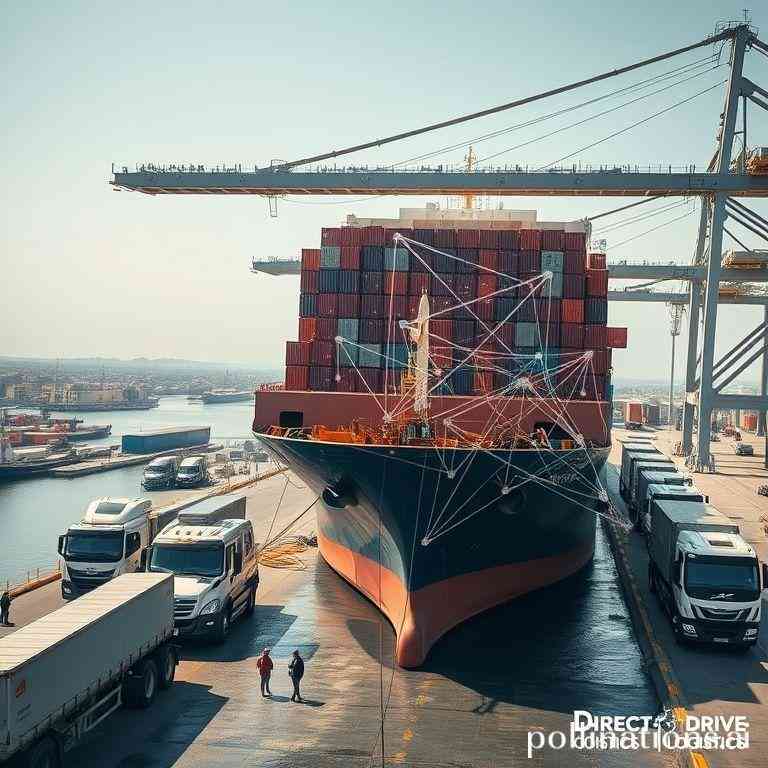Unlock Iraq Shipping: Master Regulations & Boost Business
Key Takeaways for Shipping to Iraq
- Adhere to New Regulations: Ensure mandatory 6-digit HS Codes are included in all cargo manifests for shipments to Iraq effective July 1, 2025. Also, be aware of the new Vessel Traffic System (VTS) charge, payable at the port of origin for all cargo arriving at Iraqi ports from June 1, 2025.
- Meticulous Documentation is Crucial: Prepare all required documents (Cargo Manifest, Commercial Invoice, Packing List, Bill of Lading, Certificate of Origin) with utmost precision and consistency to avoid costly delays and penalties during customs clearance.
- Proactively Monitor Policy Changes: Continuously track updates from the Iraqi Customs Commission regarding tariff changes, new protective duties, and regional specific regulations (especially for Kurdistan) as these significantly impact costs and supply chain strategies.
- Engage an Expert Logistics Partner: Partner with an experienced freight forwarder specializing in the Iraqi market to navigate complex regulations, manage customs processes efficiently, and ensure compliance in both federal Iraq and the Kurdistan Region.
Understanding Key Iraq Shipping Regulations for Businesses
The Iraqi market presents immense opportunities, but accessing it requires navigating a complex and dynamic regulatory environment. Iraq shipping regulations for businesses are frequently updated as the country works to modernize its infrastructure, protect domestic industries, and align with global trade standards. For companies looking to import or export, staying current isn’t just an advantage—it’s a necessity for avoiding costly delays and ensuring smooth operations.
A foundational element of this modernization is the classification of goods. This is where a key technical concept comes into play.
Harmonized System (HS) Code: The Harmonized System (HS) Code is an internationally standardized numerical system for classifying traded products. Customs authorities worldwide use it to identify products and apply the correct duties, taxes, and regulations.
Recognizing the importance of accurate data for customs processing, Iraqi authorities have made significant updates. A critical change to note is the mandatory inclusion of HS Codes. To streamline cargo clearance under the new SCUDA customs system, all inbound shipments to Iraq must include the correct 6-digit HS Code in the cargo manifest. This rule becomes effective on July 1, 2025, and non-compliance will lead to clearance delays and potential penalties.
Another recent development impacting updated customs policies in Iraq is the introduction of a Vessel Traffic System (VTS) charge, effective June 1, 2025. This fee applies to all cargo types arriving at Iraqi ports and must be paid at the port of origin. This demonstrates Iraq’s increased focus on maritime security and traffic monitoring, adding a new logistical and cost consideration for shippers.
Core Regulatory Bodies and Legal Frameworks Governing Freight in Iraq
Successfully managing logistics in Iraq requires knowing which authorities set the rules. Several key governmental bodies oversee the legal frameworks that govern freight forwarding and trade. Familiarity with these organizations is the first step toward ensuring compliance with Iraqi import/export laws.
Key Regulatory Authorities:
- Iraqi Ministry of Transportation: The primary ministry responsible for overarching transport policy, infrastructure, and national logistics strategy.
- Iraqi Customs Commission: The agency in charge of implementing customs laws, collecting duties and taxes, and inspecting goods at all border points, including major ports like Umm Qasr.
- Iraqi Supreme Maritime Authority (ISMA): A crucial body responsible for overseeing all maritime activities. ISMA manages vessel traffic, enforces maritime safety protocols, and administers regulations like the new VTS charge.
These bodies operate within a specific legal context established by Iraqi law. The cornerstone of this framework is the Customs Tariff Law which has been subject to numerous amendments. This law outlines the basis for customs duties and tariffs on imported goods.
Further shaping Iraq’s trade policies and impact on logistics are recent ministerial decisions. The government has shown a clear intent to protect and grow domestic industries by imposing additional duties on specific imported products. Understanding both the foundational laws and these frequent updates is critical for accurate budgeting and strategic sourcing.
Navigating Iraqi Import/Export Laws: Documentation and Procedures
Precision is paramount when it comes to customs documentation for Iraq. Even minor errors or omissions can result in significant delays, inspections, and financial penalties. To ensure compliance with Iraqi import/export laws, every shipment must be accompanied by a complete and accurate set of documents that meet the strict standards of the Iraqi Customs Commission.
The process of getting goods across the border is known as customs clearance.
Customs Clearance: This is the official process by which goods are permitted to enter or leave a country. It requires the submission of specific paperwork, inspection of goods, and payment of any applicable duties and taxes as mandated by local law.
Key Import/Export Documents for Iraq
To facilitate a smooth customs clearance process, ensure your shipment includes the following:
- Cargo Manifest: Must now include mandatory 6-digit HS Codes for every item.
- Commercial Invoice: Details the transaction between the seller and buyer, including the value of the goods.
- Packing List: An itemized list of the shipment’s contents, including weights and dimensions.
- Bill of Lading (B/L) or Air Waybill (AWB): The contract between the cargo owner and the carrier.
- Certificate of Origin: A document verifying the country where the goods were manufactured.
- Material Safety Data Sheets (MSDS): Required for any hazardous or chemical materials.
Customs valuation in Iraq is based on the CIF value of the goods. This is another essential term for shippers to understand.
CIF (Cost, Insurance, and Freight): CIF is a shipping term indicating that the seller covers the cost of the goods, insurance, and freight to a named port of destination. Risk transfers to the buyer once the goods are loaded onto the vessel, but the CIF value is used by customs to calculate duties.
Adhering to these documentation standards is non-negotiable for all types of cargo, from industrial machinery to household goods. Strict compliance provides peace of mind and is the most effective way to prevent your assets from being held up at critical entry points like the Umm Qasr Port.
Updated Customs Policies in Iraq: Duties, Tariffs, and Protective Measures
Understanding the financial aspects of importing into Iraq is critical for maintaining your budget and competitive pricing. The country’s updated customs policies in Iraq involve a multi-layered system of duties, taxes, and tariffs that directly impact your bottom line.
Customs Duty: A tax levied on goods imported across international borders, typically calculated as a percentage of the goods’ value (the CIF value in Iraq’s case).
As a general rule, customs duties in Iraq are calculated based on a tariff rate of approximately 4.19% on the CIF value of the goods. In addition to this, a customs Value Added Tax (VAT) of 5% is also applied. Both the duty and VAT must be paid in full for cargo to be released from customs. While exemptions may exist under specific bilateral or international trade agreements, businesses should budget for these standard charges.
VAT (Value Added Tax): A consumption tax placed on a product whenever value is added at each stage of the supply chain, from production to the point of sale.
A significant trend in Iraq’s trade policies and impact on logistics is the increasing use of protective tariffs. These are designed to shield local manufacturers from foreign competition.
Protective Tariffs: Duties imposed on imported goods primarily to raise their price, making them less competitive compared to domestically produced goods and thereby protecting local industries.
The Iraqi government has recently enacted several such measures. For instance, an additional 60% duty has been levied on imported transparent containers and single-use plastic cups for a period of four years. Similarly, a 30% protective duty now applies to certain rebar steel products. These targeted tariffs require businesses to stay vigilant and adapt their sourcing and pricing strategies accordingly.
Legal Requirements for Freight Forwarding in Kurdistan Region
The Kurdistan Region of Iraq (KRI) holds a unique semi-autonomous status within the federal state of Iraq. While it operates under the umbrella of Iraqi federal law, the KRI often implements its own distinct customs procedures, trade regulations, and enforcement policies. Businesses shipping to or through cities like Erbil or Sulaymaniyah cannot assume that regulations applicable in Baghdad or Basra will apply uniformly.
Navigating the legal requirements for freight forwarding in Kurdistan therefore requires specialized, on-the-ground knowledge. The regional authorities may have different clearance processes, their own list of required permits, and specific checkpoint protocols. For instance, the procedures for securing temporary import licenses for equipment being sent for repair can vary from those in federal Iraq.
The most effective strategy is to work with a logistics partner who has deep-rooted experience in both federal Iraq and the KRI. For specialized assistance with your shipments, it is wise to explore expert Kurdistan logistics services. An experienced forwarder can provide tailored advice on local documentation, navigate regional checkpoints efficiently, and ensure your cargo reaches its destination without facing unexpected bureaucratic hurdles specific to the region.
Ensuring Compliance with Iraqi Import/Export Laws: Best Practices
Successfully navigating Iraq shipping regulations for businesses comes down to proactive preparation and strategic partnerships. By implementing a set of best practices, companies can minimize risks, control costs, and build a resilient supply chain into this promising market.
Here are actionable strategies to ensure compliance with Iraqi import/export laws:
- Strict HS Code Adherence: Double-check and ensure the correct 6-digit HS Code is included for every item in your cargo manifest. This simple step is now mandatory and will be critical for avoiding delays after July 1, 2025.
- Pre-payment of Charges: To avoid holds at the destination port, ensure that all applicable origin and destination charges, including the new VTS fee and any Terminal Handling Charges (THC), are paid upfront.
- Meticulous Documentation: Treat all required paperwork—from the commercial invoice to the Certificate of Origin—with the utmost attention to detail. Ensure all values, descriptions, and quantities are accurate and consistent across all documents.
- Monitor Policy Changes: The regulatory landscape is not static. Continuously track announcements from the Iraqi Customs Commission regarding tariff changes and new protective duties that could impact your product categories.
- Engage an Expert Partner: The single most effective best practice is to partner with an experienced freight forwarder specializing in the Iraqi market. A reliable partner like Direct Drive Logistic provides more than just transport; we offer invaluable expertise in managing customs clearance, navigating checkpoints in both federal Iraq and Kurdistan, and providing the peace of mind that comes with guaranteed, insured delivery.
Case Study in Action: Accurate HS coding recently prevented a multi-day delay for a client’s shipment of industrial parts to Umm Qasr. By classifying the repair components correctly before the mandate, we pre-empted customs queries and ensured the shipment was cleared in under 24 hours, keeping the client’s maintenance schedule on track.
The Impact of Iraq’s Trade Policies on Logistics and Supply Chains
The evolving nature of Iraq’s trade policies and impact on logistics extends far beyond paperwork. These regulations have tangible effects on supply chain costs, transit times, and overall operational strategy. Businesses must understand these broader consequences to plan effectively.
Key impacts include:
- Increased Landed Costs: New protective tariffs, standard customs duties, and VAT directly increase the total landed cost of goods. The recent introduction of mandatory VTS charges and fluctuating terminal handling surcharges further add to the overall expense of shipping to Iraq.
- Pressure on Transit Times: While regulations like the mandatory HS code are designed to streamline clearance, non-compliance creates the opposite effect. A single documentation error can lead to lengthy inspections and delays, disrupting just-in-time inventory models and project timelines.
- Sourcing and Pricing Strategy: Protective tariffs aimed at bolstering local industry can make importing certain goods prohibitively expensive. This forces businesses to either absorb the cost, increase consumer prices, or explore alternative sourcing, fundamentally altering their supply chain map.
- Need for Enhanced Planning: The dynamic environment means logistics can no longer be a reactive function. It demands proactive financial planning to account for duties, strategic route optimization to mitigate delays, and a deep understanding of compliance to manage risk.
These factors underscore the need for a strategic approach. Navigating this landscape requires a logistics provider that does more than move boxes; it requires a partner that offers tailored Iraq freight forwarding solutions built on real-time intelligence and local expertise.
Mastering Iraq Shipping Regulations for Sustainable Business
Ultimately, successful and sustainable business operations in Iraq hinge on a deep understanding of and strict adherence to its shipping regulations. The complexities, from evolving customs duties to region-specific rules, demand constant vigilance and a proactive approach to compliance. For companies that master these challenges, the rewards of engaging with this growing market are substantial.
The key takeaways are clear: the mandatory implementation of HS Codes and new VTS charges are immediate operational concerns. The ongoing trend of protective tariffs requires strategic financial planning. Above all, the critical importance of precise, complete documentation cannot be overstated.
Navigating this environment alone is a significant risk. Proactive monitoring and strategic partnerships with knowledgeable logistics providers are the cornerstones of success. By engaging an expert team that offers seamless management and on-the-ground knowledge, you can transform regulatory hurdles into a competitive advantage and ensure your freight operations in Iraq are efficient, compliant, and secure.
The evolving landscape of Iraq’s shipping regulations, with its frequent updates and region-specific complexities, underscores the critical need for absolute precision and proactive compliance. Businesses must navigate new mandates like HS codes and VTS charges with expertise, turning potential hurdles into smooth operational flows. A reliable logistics partner, possessing deep on-the-ground knowledge, is essential to ensure cargo moves efficiently and securely through this dynamic market.
Frequently Asked Questions
What is the Harmonized System (HS) Code and why is it important for shipping to Iraq?
The Harmonized System (HS) Code is an internationally standardized numerical system for classifying traded products. It is mandatory for all inbound shipments to Iraq to include the correct 6-digit HS Code in the cargo manifest, effective July 1, 2025. Non-compliance will lead to clearance delays and potential penalties, making accurate classification critical for smooth operations.
What new charges or policies have been introduced for shipping to Iraq?
Two key updates impacting Iraq shipping regulations are the mandatory inclusion of 6-digit HS Codes in cargo manifests, effective July 1, 2025, and a new Vessel Traffic System (VTS) charge. The VTS fee, effective June 1, 2025, applies to all cargo arriving at Iraqi ports and must be paid at the port of origin.
Which regulatory bodies oversee freight and trade in Iraq?
Key regulatory bodies include the Iraqi Ministry of Transportation, responsible for overarching transport policy, and the Iraqi Customs Commission, which implements customs laws and collects duties. The Iraqi Supreme Maritime Authority (ISMA) also plays a crucial role in overseeing maritime activities and enforcing safety protocols.
What are the essential documents required for customs clearance in Iraq?
To ensure smooth customs clearance, essential documents include the Cargo Manifest (with mandatory 6-digit HS Codes), Commercial Invoice, Packing List, Bill of Lading or Air Waybill, and Certificate of Origin. Material Safety Data Sheets (MSDS) are also required for any hazardous materials.
How are customs duties and taxes calculated in Iraq?
Customs duties in Iraq are generally calculated at approximately 4.19% on the CIF (Cost, Insurance, and Freight) value of the goods. Additionally, a customs Value Added Tax (VAT) of 5% is applied. Both the duty and VAT must be paid in full for cargo to be released from customs.
Are there special considerations for freight forwarding in the Kurdistan Region of Iraq (KRI)?
Yes, the Kurdistan Region of Iraq (KRI) has a unique semi-autonomous status and often implements its own distinct customs procedures, trade regulations, and enforcement policies. This means that clearance processes, required permits, and checkpoint protocols can vary significantly from federal Iraq, necessitating specialized local knowledge.
Navigate Iraq’s Shipping Labyrinth with an Expert Partner?
As you’ve seen, mastering Iraq’s intricate shipping regulations is paramount for unlocking its substantial market rewards. Don’t let evolving customs duties or region-specific rules impede your progress. Partner with Direct Drive Logistic to ensure strict adherence and proactive compliance, transforming regulatory complexities into your greatest advantage for seamless, profitable operations.



